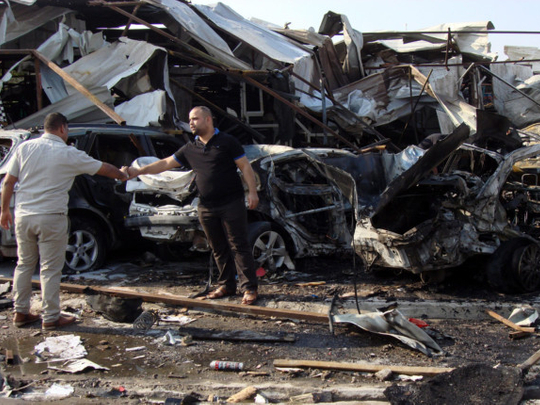
The term ‘Arab Spring’, inadvertently coined by Marc Lynch writing about the first uprisings in January 2011 in Foreign Policy, was never a seasonal development that could unravel entrenched regimes, usher in democratising governments and resolve all types of ills — domestic or foreign. Rather, what actually started in late 2010/early 2011 were a series of revolutions in the best traditions of the word, which effectively meant that dramatic transformations under way throughout the region were bound to take decades to mature. As such, it may be way too early to talk about “winners and losers” as the erudite John Simpson proposed in a recent BBC comment.
Coinage and drawing up lists aside, what emerged in less than four years was a universal constatation that while the Arab world was mired in utter violence, it was also caught in a whirlwind of dictatorships holding onto power and awakened populations that demanded representation. For example, Syrian President Bashar Al Assad enjoyed a degree of longevity, even if Syria was nearly destroyed. Likewise, Libya and Yemen faced complete chaos and Iraq fell under non-Arab control and Egypt, by far the most critical regional country, experienced dramatic changes. Elsewhere, the very idea of the nation-state came under duress, as a self-appointed ‘Caliph’ proposed to recreate a moribund system of authority last practised several centuries ago.
It was within such a context that Simpson posited that the post-2010 uprisings were “slow and inconclusive”, especially when one compared them to the more dynamic “and mostly bloodless collapse of Marxism-Leninism in central and Eastern Europe in 1989”. Naturally, because Arab revolutions have cost the lives of hundreds of thousands, and because few anticipated an end to the brutality practised at will, it was eminently logical to conclude that the Arab Spring, “if it ever existed, has long ago come to a halt in every Arab country”. Under the circumstances, one was inclined to draw up a list of winners and losers, typical of a relatively clean academic exercise.
For Simpson, Libya was ruined by the fall of the Muammar Gaddafi dictatorship; Egypt was “back in a condition of stasis”; the Syrian system persisted against revolutionaries because western countries, “though they won’t say so, have decided they would rather have” Al Assad than Daesh (Islamic State of Iraq and the Levant); Iraq weathered the Daesh storm; Jordan remained under threat but endured; Lebanon held together; Algeria and Tunisia settled down and Turkey, “watching from the sidelines, has often been worried, but has survived unscarred”.
One is not sure whether Libyans, Egyptians, Syrians, Iraqis, Jordanians, Lebanese, Algerians, Tunisians and even Turks were losers, but what was certain was the fact that they could not possibly be winners since the transformations under way did not result in cleaner changes like in the former Eastern European environment. Still, a strong argument can and should be made that Arabs in general, and those confronting dictatorial regimes in particular, have demonstrated impeccable resilience. In fact, honesty demands that one cannot take anything away from the 200,000 Syrians who paid the ultimate price for freedom, killed during the past three years under atrocious conditions. The same can be said about others who died for liberty even if Arabs have now become pawns in the hands of amoral powers. Indeed, and notwithstanding the more recent air assaults against extremists, arms merchants everywhere were giddy at ongoing business deals.
Simpson hints that the outside world, led by the US and the United Kingdom, made conflicting statements that, presumably, did not help. Although making conflicting statements passed for art in any diplomatic initiative, US President Barack Obama’s warning to his Syrian counterpart that the use of chemical weapons against insurgents would not be tolerated and then conveniently overlooking events when Damascus did precisely that, stood as a perfect illustration of American weakness and loss. Similarly, when British Prime Minister David Cameron conceded a key parliamentary vote not to bomb Syria in August 2013 — by a mere 13 votes — it was because Labour Party leader Ed Miliband had the better line: “Evidence should precede decision, not decision precede evidence.”
Of course, and in the aftermath of the more recent spectacular “Daeshi” proofs, ranging from the gamut of televised beheadings to minting currency (in which factories?), few raised critical questions regarding such gains. Was Daesh a winner or a loser? Was the sale of Daesh-controlled oil a winning or a losing proposition?
Despite the brutality that permeated the Arab world, an honest assessment of what was gradually unravelling was sheer determination to slowly change the way people in this part of the world were and are governed. Ironically, this has become evident in the Arab Gulf monarchies more than in the secularising republics, but that was one of the paradoxes of contemporary affairs. That conservative rulers would be far more attuned to the needs of their populations rather than entrenched parliamentary or presidential regimes that neglected constitutional responsibilities was, truth be told, a truly amazing development. A small win by any stretch of the imagination.
Dr Joseph A. Kechichian is the author of the forthcoming Iffat Al Thunayan: An Arabian Queen, London: Sussex Academic Press, 2015.










